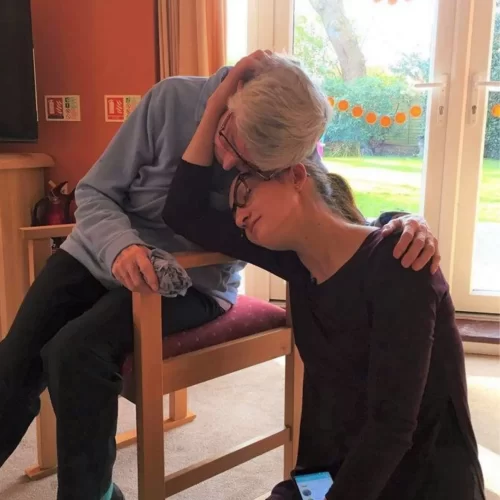Dementia Care: Choosing the Right Care Option

Dementia is a progressive disease that means your loved one with a diagnosis will likely need some form of care. As the disease progresses, the care needs will increase. But as dementia symptoms differ for each individual, the types of dementia care suitable are different. For some, home care for dementia is best for your situation, whereas for others, moving into a dementia care facility is the best solution.
Choosing the right dementia care for your loved one is important, and if you already have care in place, knowing when it might need to change can be difficult.
At LuxuryCare, we are specialist dementia care facilities across Poole and Bournemouth, offering compassionate care for all stages of the disease. We know how difficult it can be to navigate care options for your loved one. In this blog, we want to share what your options are so that you can make an informed decision.
What Are My Dementia Care Options?
Of course, the first thing you will need to understand when trying to make a decision is what options are available to you.
The most common dementia care options are:
- Home care for dementia
- Respite care (either at home or at a facility)
- Day care
- Nursing or residential care homes
- Specialised dementia care facilities
The best one for your loved one will largely depend on their care needs, but it will also depend on you and what you are comfortable with.
Each one has pros and cons and suits different circumstances.

Home Care for Dementia
Home care for dementia is exactly what it sounds like, specialist dementia care given in the comfort of your loved ones’ home.
The care can vary depending on your loved ones’ needs and will change as the disease progresses.
Care at home can include:
- Medical care (including medication management)
- Personal hygiene care (bathing, getting dressed etc.)
- Assistance with day-to-day tasks (cooking, eating, cleaning)
- Therapy (physical, music, reminiscence)
- Activities to slow the progression of the disease (puzzles, memory games, etc.)
Pros of this type of care are:
- Your loved one stays in a familiar environment
- Personalised care available
- Hours can be flexible, and the care can be provided at the time that is best for you.
- Offers a gradual transition into care
Disadvantages of this care include:
- Unless you pay for a live-in carer, it is likely that family and friends will also have to provide care between care visits
- It can get increasingly difficult with the progression of the disease
- Due to the time and length of visits, your loved one can lack stimulation and contact with others, two things that are extremely beneficial for those living with dementia
So, when is home care for dementia suitable? This type of dementia care is most suitable when:
- Your loved one is in the early to moderate stages of dementia
- There is a desire to remain independent
- There is a strong support system around
- Being at home is safe for your loved one
- There is a reduced need for constant medical attention
Respite Care for Dementia Caregivers
In some cases, you and your family might decide to take on the caregiving responsibilities. This is incredibly admirable and can be hard work at times, especially as you watch your loved one deteriorate and lose their independence.
If you become a primary caregiver, respite care means professional carers step in to give you a break and time to look after yourself.
Respite comes in many forms, so it is incredibly flexible.
Most care homes offer respite care, from day care to longer respite stays, so you can run errands or go on holiday, knowing your loved one is receiving the right level of care.
Alternatively, cares can come to your home and take over the care, so you can get out and about for yourself.
Benefits of this type of dementia care include:
- Your loved one has a familiar face for their primary care most of the time
- The primary caregiver gets a break
- Professional oversight is available
- It can be flexible to suit your needs and fit in with your schedule
However, drawbacks to this type of care can be:
- It is temporary
- Your loved one with dementia will likely have to adjust to new carers or situations each time
- There is a high demand on you and your family between respite care times
When would you choose respite care?
You would choose respite care when you are the primary carer and are happy in that role. If you are simply looking for a break of whatever length, respite care will be the best solution for you and your loved one, as it is temporary.
Day Care Services for Those Living With Dementia
Day care is often another type of respite care, as it is a short-term care type that allows the primary caregiver to take a break.
Similar to respite care, this can come in a couple of different formats:
- Care and activities at a specific day care centre
- Care is provided for the day at a care home
- Care is provided at home for the day
The other similarity to respite care is that it relies on your loved one with dementia having a family member (such as yourself) as their primary caregiver on a day-to-day basis.
Advantages of this type of care include:
- It encourages social interaction with others
- It provides an opportunity for new and engaging activities – these can stimulate the brain and slow the progression of the disease
- It can be flexible to fit your needs as well
However, things you should consider with this type of care should include:
- It is only day-time care, meaning someone might be needed in the evening and during the night
- It might require potential emotional adjustments
- If it’s not regular, those relying on a routine might struggle
- It relies on other people being available to provide care
When is this ideal?
This is more often an ideal situation for those who are in the early stages of dementia as their care needs are less demanding, meaning the support from family and friends is suitable for the day-to-day tasks.
Residential Dementia Care Facilities
Residential dementia care facilities offer full-time specialist dementia care. This would require your loved one to move out of their home and into the care home, where there are highly trained staff 24 hours a day.
Care facilities such as these offer dementia-specific facilities and activities to make life easy and fun for everyone.
Benefits of this type of dementia care include:
- 24/7 professional care
- Tailored activities
- Specialised environments
- Stimulating and engaging activities design for those living with dementia
- Contact with others daily
Drawbacks you might need to think about include:
- Care home costs
- Your loved one will have to go through a period of adjustment, which can be difficult
- Finding a dementia-specialised care home in your chosen location might be difficult
When would this option be suitable?
Most dementia care facilities will be open to your loved one moving into their facility at any point. However, it is understandable that most people want to stay at home for as long as possible.
Therefore, this dementia care option is typically turned to when your loved one has progressed to the moderate and advanced stages of the disease.
Because these facilities have trained staff at all times, they can provide high levels of care constantly, which is hard to do when your loved one is at home.
The care homes across Bournemouth and Poole run by LuxuryCare are all dementia care facilities. We have carefully designed facilities with plenty of visual cues, signs and colours to help our residents navigate through the home on their own. Plus, our staff are all trained in providing dementia care, and our activities often include therapies such as music therapy, garden therapy, animal therapy and reminiscence therapy.

How to Choose the Right Dementia Care Option
Choosing the best dementia care for your loved one can be extremely difficult. There is a lot to think about, and it is fraught with emotion.
To get you started, here is a list of things you will need to consider when looking at dementia care options:
- Stage and severity of dementia and its symptoms
- Your loved one’s personality and social needs
- Family support and availability
- Budget and financial resources
While it might feel a little overwhelming, it is important that you also consider future care needs. Due to the nature of dementia, your loved ones’ care needs will change, and that will likely mean a change in care options. You should think about how long it will likely be until their needs change so that you can think about the cost-effectiveness of what you’re putting in place.
Specialist Care From LuxuryCare’s Dementia Care Facilities
At LuxuryCare, our six care homes offer specialist dementia care.
The core of our care is getting to know the person rather than their symptoms, as this allows us to provide personalised care that meets their needs as a human, not just the needs of the disease.
It is this compassionate approach to care that facilitates their independence and gives them a quality of life that they can make the most of.
Our facilities enhance this as they are all designed to be dementia friendly. This means each room has the resident’s name on the door and a memory box inside. Plus, the spaces are bright colours and have visual cues and signage around so your loved ones will know where they are and how to get back on their own.
Life isn’t boring at our care homes because each one has an activities coordinator who organises an activities programme each week that consists of music, art, gardening (when warm enough), baking, quizzes and lots more. The activities are all adaptable to meet your loved one’s abilities. The programme also includes different types of therapies, such as animal, music, gardening or reminiscence therapy.
The final thing about our dementia care facilities is the bespoke care plans. These are created during the admission process and are based on care needs assessment, where we get to know your loved ones’ medical history and current needs, and we delve into their life story and personal preferences. It is this that sits at the heart of our care plan as it ensures we provide care in the way your loved one prefers.
We have strong values at our care home, which is why we are often chosen by families to provide dementia care.
If you are interested in learning more about our dedicated dementia care, we recommend you book a visit to your local care home in Poole or Bournemouth to see what life is like with us. Call us on 01202 037373 or complete our online contact form to arrange a visit.














